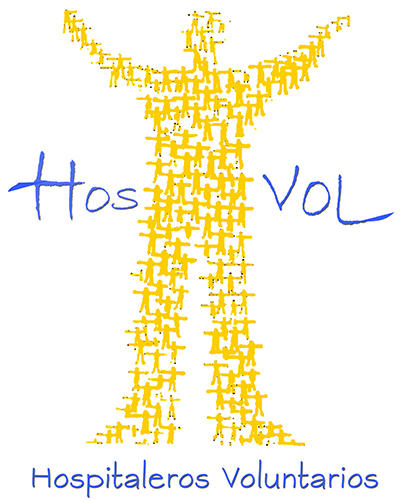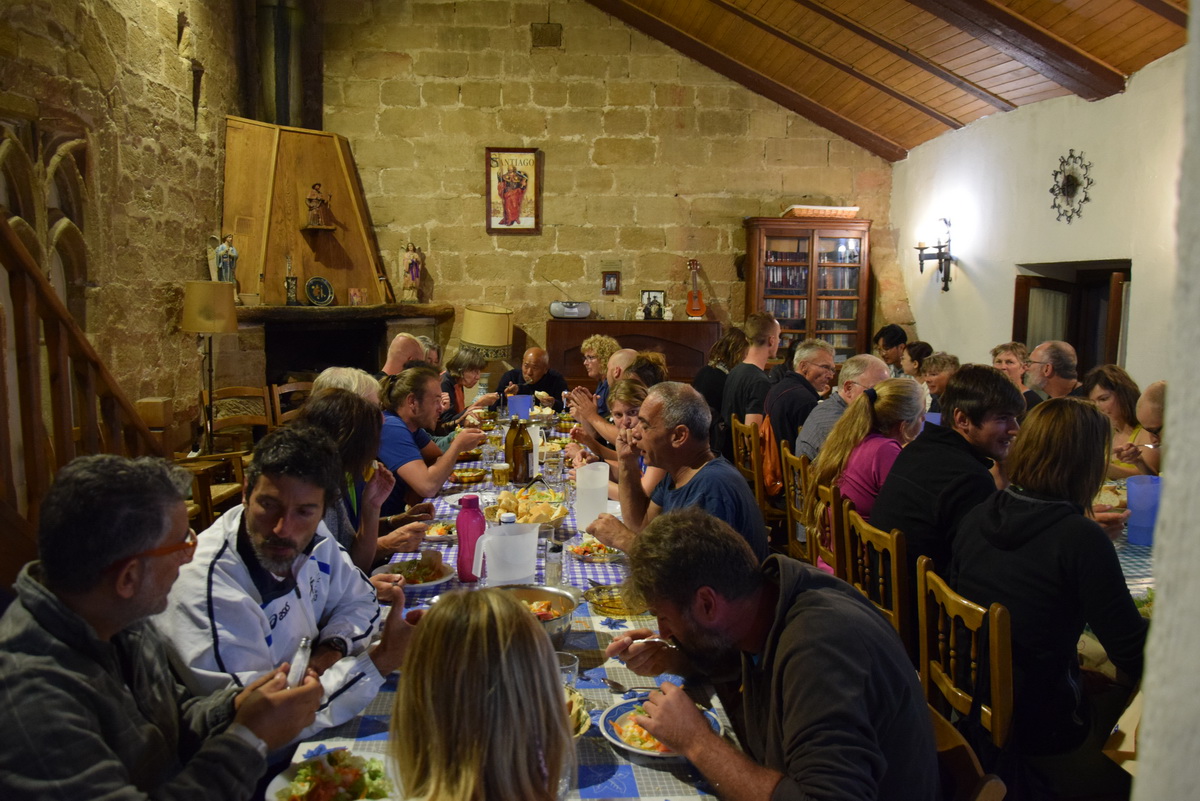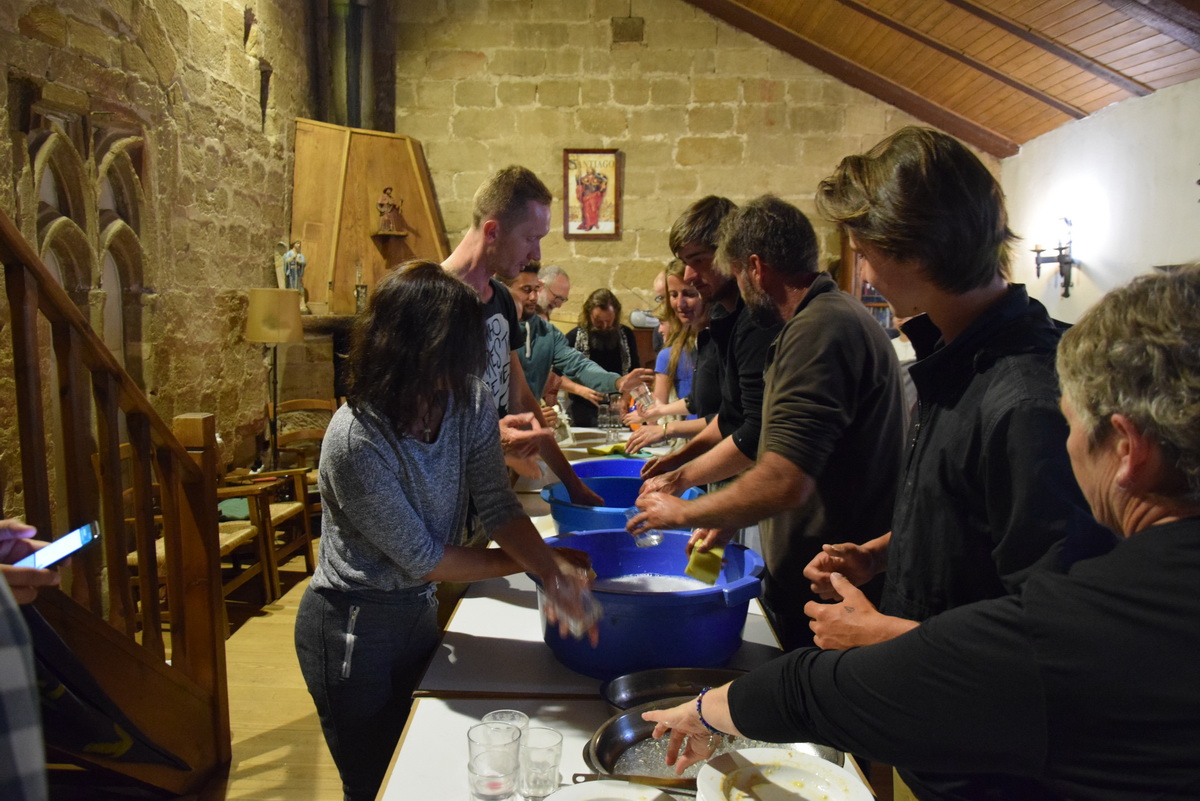THE “HOSPITALITY” STRUCTURES
We want to promote and attest to the greater value that “pilgrim” hospitality is able to offer to those who want to face this journey, both with a devotional spirit and as a simple spiritual choice. The “Giuseppe Mancino” parish hostel in Valpromaro is committed to offering not only a comfortable and functional place to spend the hours of rest, but above all, a moment of meeting and sharing with other pilgrims, hospitallers and villagers.
In addition to Valpromaro, we give priority to the accommodations that, on the route have the same characteristics, first of which is the absence of tariffs and fees for services, the amount of which is left to the intention of the pilgrim. These hospitality are defined as “donative”.
THE DONATIVE
 These Paths arise from the Christian tradition of devotional pilgrimages; we left with sandals, saddlebag and staff. A sheet signed by the local religious authority (bishop, abbot, etc.) attested to the quality of a pilgrim and invited all religious and men of faith and good will to give him assistance and comfort. The pilgrim was seen as a holy man who, taking upon himself the sins of all, faced the discomforts and dangers of the journey with serenity and faith. He was welcomed into the homes as a representative of Christ and participated at the table, found a bed, shared his story and the story of his journey.
These Paths arise from the Christian tradition of devotional pilgrimages; we left with sandals, saddlebag and staff. A sheet signed by the local religious authority (bishop, abbot, etc.) attested to the quality of a pilgrim and invited all religious and men of faith and good will to give him assistance and comfort. The pilgrim was seen as a holy man who, taking upon himself the sins of all, faced the discomforts and dangers of the journey with serenity and faith. He was welcomed into the homes as a representative of Christ and participated at the table, found a bed, shared his story and the story of his journey.
Even today, some set out on a journey in a spirit of poverty, to offer their sacrifice and approach as a model of spirituality well represented and promoted by all religions and in particular by Catholicism. Let us remember what Matthew wrote in his Gospel “… I was hungry and you gave me to eat, I was thirsty and you gave me to drink; I was a stranger and you welcomed me, I was naked and you clothed me, I was sick and you visited me, I was in prison and you came to see me.” These words were included, in the traditional teaching of the church, in the seven corporal works of mercy.
From these values originates the institution of the donation: one of the fundamental characteristics of the hostels that welcome pilgrims.
First of all, it wants to be a model of equality and sharing: the hostel welcomes everyone with equal attention and warmth. You sleep in the same dormitory, the services are shared, dinner is prepared and consumed together. Sometimes the offer is modest but no one has more or less: it serves to make the journey possible even for those who have little means.
There are still many young people with little money in their pockets who embark on a journey not knowing why, but perceiving that they will come out improved and strengthened. Numerous are the people who, in a particularly difficult moment of their existence, search the paths for the answer to the question: why am I in the world? They do it as they can, and it is a human duty, even before being a Christian one, to help and assist them. However, it is appropriate to underline one aspect, which is often misunderstood. In these structures the activity is almost always carried out by volunteers, but the maintenance of the structure, the laundry services, the shared dinner and a good breakfast have real costs: the same that we pay without delay in hotels, bars, restaurants, B & Bs. The donation must not be different precisely because the money we leave in the box, to the extent determined by ourselves, is necessary to meet the needs of those who do not have the same possibilities as us.
Donative therefore does not mean “everything is free”. Instead, it means that those with high or “normal” means of subsistence will make a donation similar to the price normally charged for the type of service they receive. Those with lower income will donate less and those who do not have the possibility will not donate anything. We therefore freely establish the amount to offer, but we are aware that what we leave will be used to welcome and give hospitality to those who will come after us.
Let’s remember the beautiful Neapolitan tradition of “suspended coffee”: we leave a paid coffee for those who cannot pay for it.
Magnanimity, generosity are great beautiful virtues. How good it feels after making a gesture of generosity! A really nice way to thank God or the Universe for the good fortune of being able to pay even for those with less luck.
The Paths arise from the Christian tradition of devotional pilgrimages; we left with sandals, saddlebag and staff. A sheet signed by the local religious authority (bishop, abbot, etc.) attested to the quality of a pilgrim and invited all religious and men of faith and good will to give him assistance and comfort. The pilgrim was seen as a holy man who, taking upon himself the sins of all, faced the discomforts and dangers of the journey with serenity and faith. He was welcomed into the homes as a representative of Christ and participated in the table, found a bed, shared his story and the story of his journey.
Even today, some set out on a journey in a spirit of poverty, to offer their sacrifice and approach a model of spirituality well represented and promoted by all religions and in particular by the Catholic. Let us remember what Matthew wrote in his Gospel “… I was hungry and you gave me to eat, I was thirsty and you gave me to drink; I was a stranger and you welcomed me, I was naked and you clothed me, I was sick and you visited me, I was in prison and you came to see me.” These words were included, in the traditional teaching of the church, in the seven corporal works of mercy.
From these values originates the institution of the donation: one of the fundamental characteristics of the hostels that welcome pilgrims.
First of all, it wants to be a model of equality and sharing: the hostel welcomes everyone with equal attention and warmth. You sleep in the same dormitory, the services are shared, dinner is prepared and consumed together. Sometimes the offer is modest but no one has more or less: it serves to make the journey possible even for those who do not have all the means.
There are still many young people with little money in their pockets who embark on a journey not knowing why but perceiving that they will come out improved and strengthened. Numerous are the people who, in a particularly difficult moment of their existence, search the paths for the answer to the question: why am I in the world? They do it as they can, and it is a human duty, even before being a Christian one, to help and assist them. However, it is appropriate to underline one aspect, which is often misunderstood. In these structures the activity is almost always carried out by volunteers but the maintenance of the structure, the laundry services, the shared dinner and a good breakfast have real costs: the same that we pay without delay in hotels, bars, restaurants, B & Bs. . The donation must not be different precisely because the money we leave in the box, to the extent determined by ourselves, is necessary to meet the needs of those who do not have the same possibilities as us.
Donative therefore does not mean “everything is free”. Instead, it means that those with high or “normal” means of subsistence will make a donation similar to the price normally charged for the type of service they receive. Those with lower income will donate less and those who do not have the possibility will not donate anything. We therefore freely establish the amount to offer but we are aware that what we leave will be used to welcome and give hospitality to those who will come after us.
Let’s remember the beautiful Neapolitan tradition of “suspended coffee”: we leave a paid coffee for those who cannot pay for it.
Magnanimity, generosity are great beautiful virtues. How good it feels after making a gesture of generosity! A really nice way to thank God or the Universe for the good fortune of being able to pay even for those with less luck.
The hospitaleros – The hostels that offer hospitality for donations make use of the absolutely free and voluntary work of Hospitalieri. Being a host can be an important experience, which follows that of the journey. Being a host means dedicating a period (usually one or two weeks) to keep a hostel open, providing for the reception of pilgrims, information, cleaning, preparing dinner and breakfasts. It is a demanding task, which requires balance and dedication as well as, of course, strong motivation.
The donation structures along the route – The hostels of Pietrasanta (San Francesco), Valpromaro, Lucca (Casa del Pellegrino San Nicolao, Foresteria della Misericordia and Pellegrinario San Davino), Lammari (Parish of San Jacopo) and Pistoia (Parish of Sant’Andrea), Serravalle Pistoiese (Dimora il Bucine) are donated. In Pescia hospitality are being prepared for the reception of pilgrims: it will be our responsibility to provide information as soon as possible.
Alternative hospitality – For the traveler who has to plan a stage or the entire route, new tools are now available. Possible admissions have increased since private homes or single rooms became available through the AIRBNB website (www.airbnb.com). The offer is always very abundant and varied, able to satisfy the needs of an individual or a large group, often at very attractive conditions.
Higher intensity instruments such as COUCHSURFING (www.couchsurfing.com), BEWELCOME (www.bewelcome.org), HOMEAWAY (www.homeaway.it), WARMSHOWERS (www.it.warmshowers.org) also have the advantage of allowing a real and own immersion in the places where you travel. Wonderful encounters with interesting people. Whoever opens his home to a traveler can only be a lively and curious person and it is worth getting to know him. Furthermore, these sites guarantee a high level of security, produced by sharing feedback. In short, if an apple is rotten, we all know it immediately.
More oriented towards traditional hospitality sites such as BOOKING, TRIVAGO, KAYAK, EXPEDIA, through which it is possible to find a room or a place in a hostel. Frequent offers especially for those who make a habitual use.
Moments of sharing at the hostel in Grañon: washing dishes

